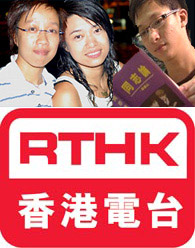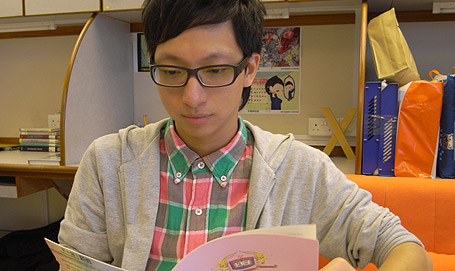Hong Konger Joseph Cho Man-kit (Siu Cho to his friends, of whom there is a growing number) is about to get his judicial review of the Broadcasting Authority's censure of Radio Television Hong Kong (RTHK) over its programme Hong Kong Connection - Gay Lovers. The review has wide implications and is an important one for the gay community in Hong Kong, so before launching into a discussion of the issues it raises, let us remind ourselves of the story, which Fridae.com has reported on several times since it broke.

"The programme was presented in the form of a documentary and that the contents of the programme about homosexuality and the legalization of homosexual marriage were controversial in many societies including Hong Kong. The programme was therefore a factual programme dealing with matters of public policy or controversial issues of public importance in Hong Kong and should be subject to the impartiality rule under the relevant code. However, the programme presented only the merits of homosexual marriage and featured only the views of three homosexuals on the legislation of homosexual marriage, rendering the presentation unfair, partial and biased towards homosexuality and having the effect of promoting the acceptance of homosexual marriage."
The programme had in no way 'promoted' anything, so RTHK objected to this ruling. However, despite the fact that it is clear that the Broadcasting Authority was applying a stricter line than that called for in the Generic Code which governs broadcasters' activities (the Code does not require absolute neutrality, but allows editorial judgment), and the certain fact that the Code does not stipulate the inclusion of opposing viewpoints on every programme, RTHK did not appeal to the Executive Council. This it was their right to have done, but one factor which must have weighed in their decision not to appeal was the political pressure brought to bear on them by Joseph Wong, Secretary (Minister, in effect) for Commerce, Industry and Technology, and himself an ex officio Executive Council member. His portfolio includes broadcasting and he took it upon himself to meet the RTHK Director of Broadcasting to 'show his concern' and to frame Chu's refusal to issue a 'repentance' statement as defying the memorandum signed between RTHK and the Broadcasting Authority on programming guidelines. In the face of this, RTHK can be forgiven for thinking that an appeal to Exco would not have been worth the bother. It did, though, refuse a request by the Broadcasting Authority to broadcast some representative anti-gay comment.
The issue was taken up by Hong Kong's Legislative Council in March this year, when Legco's Panel on Information Technology and Broadcasting held a session to examine the matter. After hearing testimony from all sides, they concluded that:
"This Panel considers that the decision of the Broadcasting Authority concerning the episode entitled Homosexual Lovers in "Hong Kong Connection" of Radio Television Hong Kong (RTHK) is in fact discrimination on the ground of sexual orientation."
They went on to urge the Broadcasting Authority to withdraw its decision. The Broadcasting Authority ignored the Panel, claiming that it had no power to reverse its decision. So, the ruling stands. What it means in effect is that RTHK, and all other broadcasters, will be obliged to include some representative of the anti-gay lobby in every documentary programme mentioning LGBT subjects.
There things would have stood had it not been for the bravery of Siu Cho, who decided to fight. Initially, he tried all administrative routes of redress: an online petition to the Chief Executive with about 2000 signatures received no reply. The fundamentalists organised a counter petition and, at a conference they called in June, boasted that they outnumbered Siu Cho's supporters. The Broadcasting Authority was petitioned, of course to no effect. The Ombudsman was approached, however the Ombudsman had no powers to intervene since the Broadcasting Authority is simply excluded from the list of organizations to which the Ombudsman Ordinance applies, while TELA is on the same list. The reason of such exclusion is unknown.
Complaints to the Equal Opportunities Commission would get nowhere in the absence of any legislation against discrimination on the grounds of sexual orientation. A submission to the Gender Identity and Sexual Orientation Unit, established in the Home Affairs Bureau in 2005 to 'actively promote equal opportunities for gays, lesbians and transgender persons' (as the Hong Kong Government put it in its obligatory report to the United Nations) was merely 'actively' forwarded to the Broadcasting Authority.
Eventually, only an application for a judicial review was left, an impossibility had not Hong Kong's legal system remained free enough to rule that the issue was of sufficient public importance to warrant the grant of legal aid. Such, thankfully, it did, and with the help of his solicitor, Michael Vidler, who recently helped Billy Leung overturn one of Hong Kong's discriminatory criminal buggery/sodomy laws, and barrister Hector Pun Hei, who has been involved in the conservationist fight to save Queen's Pier, Siu Cho has been granted legal aid to challenge the Broadcasting Authority's ruling in the courts. The date of the review is yet to be announced but it will be soon. The case will be fought by the Government and is expected to be a long one.
The implications of all this are wider than they seem. This is not some obscure dispute about a single programme and a TV broadcaster's code of ethics. This is a major issue of media freedom and religious-inspired censorship. What has also become clear since January 2007 is that the Broadcasting Authority's ruling is in danger of becoming Hong Kong's equivalent to Britain's notorious section 28 (of the Local Government Act) which, enacted by Margaret Thatcher's government to ban the 'promotion of homosexuality' in schools and other institutions, in effect banned any discussion of the subject at all. 'A similar chilling effect is visible now in Hong Kong,' says Siu Cho, who has personal experience of this already. Interviewed by me recently, he said that he had been invited to appear on an Cable TV programme in January, but that, after the Broadcasting Authority ruling, Cable TV felt itself compelled to invite a fundamentalist to take part. As a result, Siu Cho withdrew. In another case in which he has been involved personally, a government social worker delayed, then effectively shelved, an invitation to Siu Cho and others to share their experiences with a public audience. The man had been subjected to pressure from a superior who feared that, after the Broadcasting Authority ruling, the Hong Kong Government, who were his employers, would accuse him of 'promoting' homosexuality.
In such dry bureaucratic processes are the seeds of censorship nurtured. Of course, we have no real way of telling why the Broadcasting Authority's members acted and continue to act the way they do. This case does, though, raise the issues of the criteria for the appointment of members to such statutory bodies and the way Government appointees have been found repeatedly attempting to impose their own moral codes within their spheres of responsibility. In this case, as with the case of the 2005 appointment of the Society for Truth and Light to teach 'human rights' to school teachers, where civil servants in the Education and Manpower Bureau issued almost identical statements to those of the fundamentalists, we seem to see some partiality towards the fundamentalist right lurking in corners of the Government and its appointed organs. This is a partiality which is much in evidence in Hong Kong's often religiously sponsored schools. It may not be coincidental, here, that one member of the Broadcasting Authority is a headmaster in a church secondary school.
What underlies this issue is a concerted attempt by the fundamentalist activists in bodies such as the Society for Truth and Light and New Creation to infiltrate the views they derive from their interpretation of the Christian faith into all discourse on LGBT issues. This is not something new. Some years back, New Creation persuaded the Hong Kong Government to include them in meetings of the Sexual Minority Forum, a body set up to provide liaison between the LGBT communities and the Home Affairs Bureau (now the Constitutional and Mainland Affairs Bureau). They did so on the spurious grounds that they represented a 'minority within a minority', the gay people who didn't want to be gay. Now, all discussion between the LGBT communities and the Government includes, and of course is monitored by, the Christian right, which is doing all in its power to prevent those discussions bearing any fruit at all. Continually now, in the Hong Kong press, advocates of these groups demand to be given the right to air their prejudices every time any LGBT issue is debated. They do so, of course, to be enabled to continue to exercise their 'right' to discriminate. They do so that, even if it is no longer legally possible in Hong Kong to put all gays and lesbians back in the closet, all discussion of issues concerning them can be locked up there instead. The Hong Kong Government, or at least several large parts of it, seems to have swallowed these arguments and has given these organisations not only credence but public funding to spread their views. The Society for Truth and Light, for instance, runs courses in our secondary schools, courses on which it hands out pre-printed forms of complaint for the students to send to Government departments about any broadcast they dislike. Forms, it would seem, which are likely to have been paid for by the taxpayer.
So, the issues are clear. In seeking this judicial review, Siu Cho is fighting not only for the freedom of the press to examine and comment uncensored upon LGBT issues. He is also striking a blow against the growing attempt by the Christian right to manipulate Government policy and to insert itself into every debate upon LGBT rights. His action is a major part of the ongoing struggle in Hong Kong to have a law enacted against discrimination on the grounds of sexual orientation, for this will never happen without open and informed public debate. It is clear that a great deal hangs on the results of this review, much that affects us all. The next few months of legal argument will set the parameters for public debate on LGBT issues in Hong Kong for some time to come. We will watch with more than interest.
This guest column was written by Nigel Collett for Hong Kong's Civil Rights for Sexual Diversities (www.cr4sd.org), a NGO working for the rights of people who may be disadvantaged by the law, policies and social prejudices in Hong Kong because of their sexual orientation, gender identity and sexual expression. The column will be written by founding member Roddy Shaw and various writers.
Nigel Collett is an English biographer and businessman living in Hong Kong. Author of several books, including The Butcher of Amritsar, he has written for GMagazine and reviews for the Asian Review of Books. He is a moderator for the Hong Kong Man International Literary Festival.

